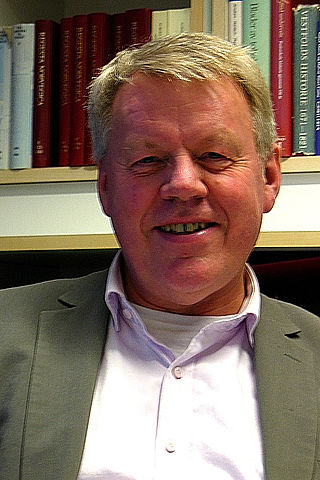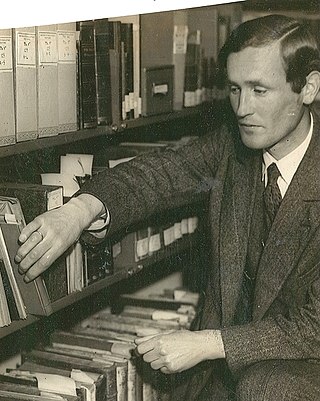Related Research Articles
Knut Kjeldstadli is a Norwegian historian. Kjeldstadli completed his examen artium at Oslo Cathedral School in 1967 before studying English and social economics at the University of Oslo, where he completed his master in history in 1977. He took his doctorate in 1989 with the paper Jerntid. Fabrikksystem og arbeidere ved Christiania Spigerverk og Kværner Brug fra om lag 1890 til 1940. He became adjunct professor at the University of Bergen in 1992, and then professor at the University of Oslo in 1996. He is a member of the Norwegian Academy of Science and Letters. Kjeldstadli is also involved in politics, in the Socialist Left Party as well as ATTAC. Kjeldstadli was awarded the Brage Prize in 2003 for serving as editor of Norsk innvandringshistorie. He was also a recipient of the Sverre Steen Award in 2004. He was the son of historian Sverre Kjeldstadli, paternal grandson of trade unionist Lars Kjeldstadli (1870–1934), maternal grandson of editor Daniel Grini and grandnephew of politician Sigvart Grini.
Jan Eivind Myhre is a Norwegian historian.
Øystein Rian is a Norwegian historian who specializes in the history of Denmark-Norway from 1536 to 1814, particularly its political, social and religious history.
Ottar Dahl was a Norwegian historian and historiographer.
Kåre Lunden was a Norwegian historian, and Professor Emeritus of History at the University of Oslo.
Jarle Simensen is a Norwegian historian.
Knut Helle was a Norwegian historian. A professor at the University of Bergen from 1973 to 2000, he specialized in the late medieval history of Norway. He has contributed to several large works.
Ingrid Elisabeth Semmingsen was a Norwegian historian. Appointed as a professor at the University of Oslo in 1963, she was the first female professor of history in Norway.
Anders Reidar Kjellberg was a Norwegian art historian and museum director.

Hans Fredrik Dahl is a Norwegian historian, journalist and media scholar, best known in the English-speaking world for his biography of Vidkun Quisling, a Nazi collaborationist and Minister President for Norway during the Second World War. His research is focused on media history, the totalitarian ideologies of the 20th century, and the Second World War. He served as culture editor of Dagbladet 1978–1985 and has been a board member of the paper since 1996. He was a professor at the University of Oslo 1988–2009, and is now a professor emeritus.

Knut Sprauten is a Norwegian historian.
Sivert Langholm was a Norwegian historian.

Edvard Freydar Beyer was a Norwegian literary historian, literary critic, and professor at the University of Oslo from 1958 to 1990.
Knut Einar Eriksen is a Norwegian historian.
Arne Odd Johnsen was a Norwegian medieval and economic historian.

Reidar Omang was a Norwegian historian, librarian and archivist.

Per Maurseth was a Norwegian historian and politician for the Socialist Left Party.
Gro Hagemann is a Norwegian historian.

The Chancellor of Norway was the most important aide of the King of Norway during the Middle Ages, and during the Union with Denmark. He issued laws and regulations, and was responsible for day-to-day administration of the kingdom. From 1270, the Chancellor resided in Bergen. Haakon V of Norway moved the Chancellor's residence to Oslo; on 31 August 1314 the provost of St Mary's Church became Chancellor on a permanent basis. He was given the Great Seal of the Realm "for eternity." The Chancellors were originally chosen from the clergy but after 1542 the position was given to people from the nobility. The position lost its importance after Jens Bjelke's tenure, and was abolished in 1679.
Pål Sverre Benum was a Norwegian long-distance runner. He specialized in the longest track distances, 5000 and 10,000 metres, eventually competing at the 1964 Olympic Games. He also competed in cross-country running. On the track he became national champion three times, in addition to nine titles in cross-country. After his active career he became a professor of medicine.
References
- 1 2 3 "Benum, Edgeir (Reidar)". Store norske leksikon . Kunnskapsforlaget. 2007.[ permanent dead link ]
- 1 2 Profile Archived 2007-05-10 at the Wayback Machine at the University of Oslo
- ↑ "Gruppe 1: Historie" (in Norwegian). Norwegian Academy of Science and Letters. Archived from the original on 23 September 2015. Retrieved 26 October 2009.